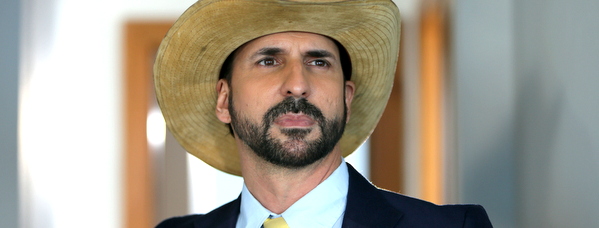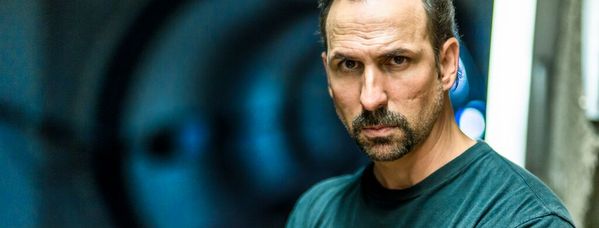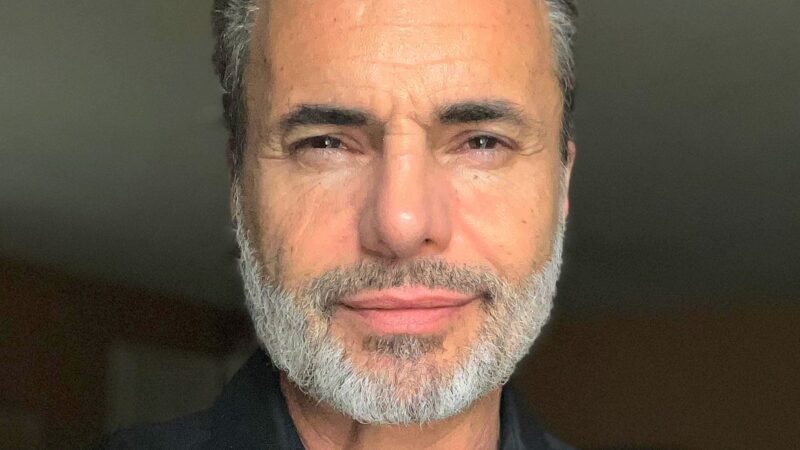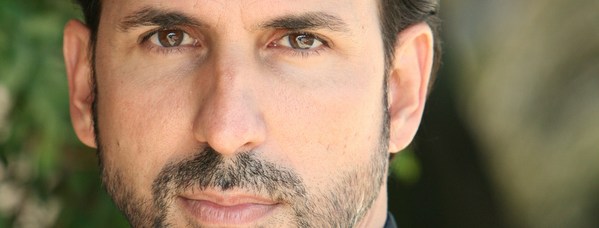
Hi, I am Oscar Torre, and my first time on stage I must have been like six years old and I was basically an extra in a school play. Later in college, I had asked my girlfriend to sign me up for an elective class, and as a joke she signed me up for an acting class – she knew I was very shy. I spent the whole semester without doing anything in the class. For one of the very last classes, the teacher assigned us an exercise – to bring a private moment on stage. The only thing I could think of was the moment I said goodbye to my grandmother before she passed away. The moment I stepped on stage, it was magical. I was back at the hospital and my grandmother was lying on a bed. I forgot about the exercise or that I had a class looking at me; from that moment on, I was hooked.
BTS #Ladrones. Con @OcarrasquilloTV, @DIEGOVICOS y… pues… #FernandoColunga 😉 pic.twitter.com/wTKpc7WHCX
— Ladrones The Movie (@LadronesMovie) August 17, 2015
Did you study acting
I have been lucky to study with a lot of good acting teachers and directors whom I’ve learned a lot from as well. My first teacher while living in Miami, Fl was Teresa Maria Rojas, who taught me to love the theater and respect the craft. I also did a play when I was first starting out (Big Al) and I learned so much from the director, Frank Fernandez. He taught me about creating a character, making strong choices when acting. I studied for a short period of time with Daniel Chernau who taught Meisner and drilled in me to always focus on the other actor and to get out of my head. Then when I moved to LA, I studied with Sal Romeo for a long time, and it was a safe place for me to grow and take chances. I also did a lot of relaxation exercises and sense memory work while studying with Sal and Stacey Martino, (who also taught there.) Sal also introduced me to my wife, actress Chuti Tiu. I also studied for a short period of time with Academy Award winner Bobby Moresco, (writer of Crash) and 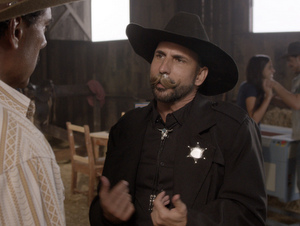 with him I also learned not only about acting but about writing and directing. I am constantly studying, reading, doing research, trying to learn new things because over the years I’ve found that I need to stay sharp and constantly be feeding my imagination. I also have to add that my baseball coach growing up, Jorge Taylor, influenced me greatly. From him I learned the importance of discipline and hard work, and to this day I still go about my work as an athlete would
with him I also learned not only about acting but about writing and directing. I am constantly studying, reading, doing research, trying to learn new things because over the years I’ve found that I need to stay sharp and constantly be feeding my imagination. I also have to add that my baseball coach growing up, Jorge Taylor, influenced me greatly. From him I learned the importance of discipline and hard work, and to this day I still go about my work as an athlete would
What acting technique do you use
I (Oscar Torre) honestly use everything I can and then some when preparing for a role – whatever captures my imagination. Every role is different but when I’m on set I try to stay relaxed, focused, and depending on the role that might mean staying very quiet or joking around and staying loose. I try to stay as close to the role as possible but the goal is always to do whatever keeps me focused on the scene that I’m about to shoot. While in the scene, I try to give in to the circumstance and see where that takes me and it becomes very basic at that point. What do I want and how do I plan to get it from the other person in the scene? (Always focusing on the other person and also letting the environment affect me.) I found by doing that, you stay out of your head and it really makes the scene come alive and more interesting because I don’t know exactly what I’m going to do and I’m not married to a given result.
What wrong impressions do actors hold about acting
That anybody could do it well without training. I can tell you, anybody could do it badly without training and preparation. To make it look easy and effortless takes a lot of work and dedication. With every role, I always feel like I’m starting from scratch and that I forgot to act and have to relearn everything again. It’s not a pleasant feeling but it keeps me sharp and on my toes. I don’t ever want to give a bad performance because I didn’t give it my all, but that’s me (Oscar Torre).
Do you take courses to improve your craft
When prepping for a role, I like to do a lot of research, so that often entails me meeting with people who’ve gone through similar experiences as my character or learn new skills or accents etc. I love that through this work I often end up learning things that I would have never been interested in otherwise, if it wasn’t for a given role that required a certain skill. I almost feel that I have to earn the right to portray the role that I’m playing – that feeling drives me to work hard. It also makes it a lot easier for me when I’m actually playing the role because at that point I feel like I have a full tank and I don’t have to think about anything, it’s all the at a cellular level, if you will.
What acting books do you read
I’m constantly reading, not only acting books but books on writing and directing. I have a few favorite books that influenced me. The first one was Eric Morris’ “Acting and Doing.” Ivanna Chubbuck’s “The Power of the Actor,” I’ve read a million times. Most recently, I’ve read about 4- 5 times Laurent Tirard’s “Movie Makers’ Master Class.” “The Artist Way” by Julie Cameron is a fantastic book, Eckhart Tolle’s “Stillness Speaks” is not about acting but so much of it could be. These are only a few of the many books that have affected my life as Oscar Torre.
How do you keep fit as an actor
I try to stay in shape year round because you’re never sure when the next job will come, and you need to be physically and mentally ready. In my case, some roles require for me to lose or gain weight, and that is much easier if I’m at my average weight. I do this by working out with weights and cardio at least 4 days a week. I’m also constantly working on my craft/ projects – this doesn’t mean that they end up getting made, but it doesn’t matter. It keeps me alive, sharp and creating . I’m always looking to be inspired. If you keeps your eyes open, as an artist you could learn so much and you never know where that knowledge is going to come from.
When you’re offered a role, what do you do next
I read it very carefully and make notes on the side of the script. It’s my first impression. Then I’ll read it again and again. at this point I have a bunch of notes on the script. I write down ideas that might pop up or questions that I might have for the director. Once I’m ready to get the character on its feet, I take him out for a test run. For example, I once played a role of a guy who was missing half his tongue, so once I found how I would speak, I went out and would talk to people that didn’t know me – by doing that, I discovered how people’s reaction to his impediment affected him growing up. This exploration/preparation is something I really enjoy doing because it really feels like I’m playing.
How do you take a character in a script to a honest, believable and breathing person
Like I said in the prior question, I first read the script many times to get a good feel for what the writer is trying to say. Then I start trying to figure out the basics, which of course apply to any character you or I can play:
– What is my super-objective (my character’s dreams, goals, reasons for waking up in the morning)
– What is my objective for each scene (what do i want? How do i plan to get it?
– What are my obstacles – what is keeping me from achieving these goals.
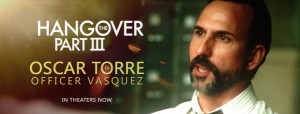 I also like to explore what happens to me if I don’t achieve my goals and my dreams. I try to make life or death choices (the higher the stakes, the better) also important is exploring what the other character in the scene wants from me.
I also like to explore what happens to me if I don’t achieve my goals and my dreams. I try to make life or death choices (the higher the stakes, the better) also important is exploring what the other character in the scene wants from me.
I do a lot of creation work, making it real for myself. For example, if I mention in the story that I grew up in Boston, I spend a lot of time exploring what that was like for me. I try to be as specific as possible, and this is something you can never do enough of. When I’m working on a project, I like to always think of my character’s life as my own, because I’m basically creating a whole life from scratch.
Do not betray the script just to create something that is interesting to you. Remember the writer spent a lot of time writing the right words for you to say.
How do you stay fresh on set
Each role for me is different, but I usually try to stay as close to my character as possible. If I play someone who is happy and talkative, I try to do the same on set. In much the same way, if the character is quiet and reticent, on set I keep to myself.
Describe a memorable character you played
I’ve been blessed to have played quite a few roles that I really enjoyed and learned something from. Most recently, a memorable character that I played was Miguel in “The Boatman,” directed by Greg Morgan, which is currently doing the festival circuit. I play the lead role: a coyote with a perfect record. The narcos are pressuring me to give up my routes, but strangely enough, dead people keep showing up everywhere I turn. It is a complex role, because he is a man of few words. He’s not necessarily a good person, yet he finds himself doing the right thing, for reasons that even he can’t explain. It’s a film with a lot of interesting surprises along the way, and I’m very proud of the work of everyone involved with it.
Explain one creative choice you took on set
This wasn’t on set of “The Boatman,” but it was something that I discovered in the process of prepping for the role of Miguel. I decided to speak with a hoarse voice. It’s as if my character, Miguel, never speaks. He’s rusty at it. Also, with this character the hair was something important to me. I wanted it to be longer, bushier, messy, covering a lot of his face, as well as a large beard covering half my face. I wanted to feel a sense of being unkempt, as if I didn’t care about my appearance or what anybody thought of me. I also found myself not making a lot of eye contact with the people I spoke to. I really didn’t want to talk to them – I needed something from them. Doing this created a certain rhythm in my speech that wasn’t necessarily planned.
What do you want most from a director
I heard Tom Hanks once say: I want a fan! I agree. I want someone who makes me feel that everything I try is ok – there is no wrong, just better choices. I want a director who I know I can take chances with and he or she has my back. At the same time, I want a director who knows what he wants. In the last two films I shot (“Ladrones,” 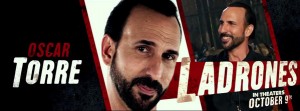 directed by Joe Menendez and “The Boatman”), I felt I could try anything and I was not going to fail. For this to happen, they created an environment on set where this was possible, where I felt safe to be creative.
directed by Joe Menendez and “The Boatman”), I felt I could try anything and I was not going to fail. For this to happen, they created an environment on set where this was possible, where I felt safe to be creative.
What advice would you give to actors
Don’t sit around waiting for your big break while complaining that other people are working and you’re not. That is a waste of energy. Get in a good class. If you can’t afford one, find other actors and do scene work. Create your own material. Go out and shoot a movie – you can now shoot a movie with an iPhone. It doesn’t have to be good; the main thing is that you’re being creative, taking control of your career. When that big opportunity comes your way – you’re ready!

